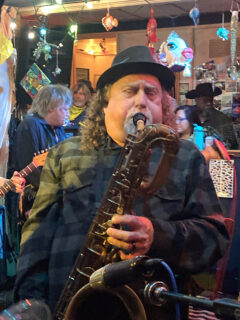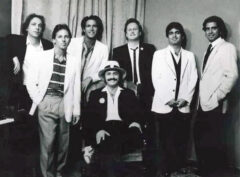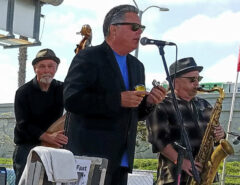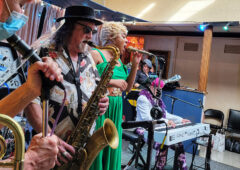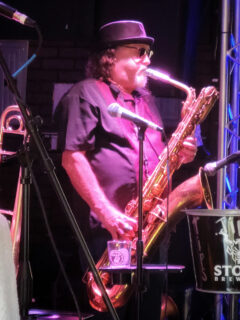Featured Stories
Sideman: The Soul Tenor Saxophone of Jonny Viau
Don’t get me wrong, I love John Coltrane! The thing that bothers me, though, is it seems most every tenor sax player who came along, after Trane recorded A Love Supreme in 1965, only wanted to sound like that and paid little or no attention to all the great rhythm and blues sax-men who came before, guys like King Curtis, Jr. Walker, Clifford Scott, Percy France, Hal Singer, Buddy Tate, Maxwell Davis, Bumps Myers, and Willis Jackson. Not too different than what happened with blues guitar players who came along after Stevie Ray.
But there’s this cat from Poway, California (he’s fond of saying that he “put the ‘pow’ in Poway”) by the name of Jonny Viau, who over the past 40 years has made a far-reaching reputation for himself as one of the best and most authentic practitioners of 1950s rhythm ‘n’ blues and ’60s soul tenor sax in the world today. And, if you really wanna know why, just listen to his rendition of Bill Doggett’s “Honky Tonk” on Blue Largo’s What a Day record or King Curtis’ “Soul Serenade” on Jonny’s own Sideman record.
I first encountered Jonny playing in the King Biscuit Blues Band in 1981. Around this time I was just discovering blues myself, and I definitely was not an aficionado of blues tenor sax players by any stretch of the imagination. But I had recently fallen head over heels in love with T Bone Walker and as soon as I heard Jonny, his tone, his phrasing, and just his overall musical vibe, I thought that he sounded a lot like Maxwell Davis on my T Bone records. And then I fell in love with Jonny, as well as T Bone!
Around six months later I joined King Biscuit myself, and Jonny and I played together in that band for four and a half years, a minimum of three nights a week, 50 weeks out of the year. We took off for two weeks before New Years Eve.
After King Biscuit disbanded in 1986, Jonny played with me in the Rhumboogies, the Juke Stompers, the Blonde Bruce Band, 47 Combo with Nena Anderson, and Blue Largo, all between 1988 and 2018! Hell, we’ve been together longer than most people are married! And after standing next to Jonny on the bandstand for literally thousands of nights, over 34 years, there was never a time when I wasn’t inspired by his deeply soulful playing and beautifully lush sound. As a rhythm guitar player, Jonny always has been one of my favorite soloists on any instrument to back up!
But my musical journey with Jonny is only one facet of his long and illustrious career!
In the late 1980s, Jonny and fellow San Diegan, Troy Jennings, formed what quickly became one of the most sought-after horn sections in the blues world at that time. Jonny was on tenor and Troy played baritone, and together they created—it seems almost supernaturally—just about the biggest, warmest, fullest two-man sax section anyone has ever heard! And it was their own sound! They didn’t sound like anyone else, which could just as easily be said of Jonny’s individual playing. I can recall several times, driving my Riviera and listening to KLON (KJAZ) out of Long Beach, when I knew right away that it was Jonny and Troy on whatever song the DJ was playing, even if I’d never heard it before and maybe didn’t even know who’s record it was!
Jonny and Troy pretty much became the house horn section at Pacifica Studios in Los Angeles during the 1990s and can be heard on a multitude of albums by such blues luminaries as William Clarke (Aligator Records), Kirk Fletcher (JSP Records), Roy Gaines, Clarence Holloman and Carol Fran, and Jimmy Morello. Jonny also played on albums by Kid Ramos, James Harman, Rod Piazza, the Forbidden Pigs, Solomon Burke, Billy Watson, the Mississippi Mudsharks, Candye Kane, the Beat Farmers, the Pleasure Barons, and Chris James and Patrick Rynn, a virtual who’s who of the blues world during the 1990s. And, most recently, he can be found on Kim Wilson’s new album Take Me Back, which has been nominated for a 2022 Grammy Award.
Throughout the ’90s and early 2000s Jonny has also toured the US and Europe with such artists as Roy Gaines, Candy Kane, Rod Piazza and the Mighty Flyers, Mitch Woods and the Rocket 88s, and the Blues Beatles (from Brazil.) And when he was back home in San Diego, in addition to his continuous work with my various bands, Jonny was a regular member of Tom Moore’s Five Careless Lovers and Jimmy Woodard’s Swingin’ King’s; he currently plays with both the Tighten Ups and Sue Palmer’s Motel Swing Orchestra.
When my editor asked me to write this article/interview on Jonny (as well as the one I did on Jimmy Woodard for the Troubadour’s February issue), she said her intention was to shine the spotlight on the great sidemen in the San Diego music scene, who deserve so much credit for making the front men and women they play with sound as good as they do but who very rarely get that credit. And while I think Jonny has been the quintessential sideman for the past 40 years, I would be remiss in not mentioning that he’s also led his own great band, the Jonny Viau Blues Allstars, featuring either Billy Seward, Dave Pruitt, and Sharifa Mohammed at different times. Jonny recorded three highly acclaimed albums with his own band: the appropriately titled Sideman, Live at Dizzy’s, and Sharifa & the Good Thing: Real Soul.
Before turning it over to Jonny himself, I’d like to conclude this introduction by saying that most of the musicians I know want to make an impact. They want their presence to be felt and they want their art to be appreciated by the public and maybe even more so by their peers. And in this regard, I believe Jonny’s 40-plus years’ musical career has been a huge success. To many of us, he’s not only made an impact on our community and beyond but he’s also somewhat of a living legend! Take it from someone who knows, the San Diego blues and roots music scene would not be quite what it is if not for Jonny Viau!
INTERVIEW
Eric: Okay JV, let’s start by going all the way back! What do you remember to be your very first musical inspiration?
Jonny: It was when I saw the Beatles on the Ed Sullivan show in 1964, when I was seven years old. And then my folks took me to see the movie A Hard Day’s Night, and shortly after that to a live Rolling Stones concert, which sealed the deal. I was hooked on being a musician!
Eric: It’s pretty cool to think that the exact same moment the light turned on for you, it also turned on for me (at least if we ignore the East Coast/West Coast time difference), because we were both watching the Beatles on The Ed Sullivan Show on that fateful night in February 1964! It’s like we really started our 35-year journey together almost 20 years before we even knew each other, and when we were living three thousand miles apart. And what a great testament to just how powerful the Beatles’ influence has been.
I also think it’s super cool that your parents took you to see both A Hard Days Night and especially to see The Stones live!
Now, after you first caught the music bug from seeing the Beatles and the Stones, who were your next musical influences, and particularly those who inspired you to want to be a saxophone player.
Jonny: King Curtis (Curtis Ousley) was my primary influence and inspiration at the beginning of my professional career, which began when I was still in high school. I always thought King Curtis was the ultimate R&B sax player, and he was also a session musician, music director, and record producer, who played and/or recorded with all of the greats throughout the 1950s and ’60s. That’s him on Aretha’s “Respect!” King Curtis had a syncopated and percussive style of playing that I’ve really tried to capture in the essence of in my own playing.
While he’s not a sax player, I’m also a big fan of Frank Zappa. I love his attention to detail and work habits when recording. And listening to his records has helped me learn how to listen better and be more efficient in the studio.
I love Rahsaan Roland Kirk, a genius musician who can circular breathe and play three saxophones all at the same time. And, finally, I’d like to acknowledge George Matoin, a fellow saxman who I first played with in the King Biscuit Blues Band back in 1983 and many times thereafter. George taught me how to play with good taste, with the concept of “less is more,” and how to get the most out of every note.
And I guess in one way or another, I’ve been influenced by all the great musicians whom I’ve had the privilege to play with throughout my career.
Eric: I know you decided that you wanted to be a musician after seeing the Stones in 1964 or ’65, but when did you actually acquire your first instrument and start learning how to play? I’m also curious about whether it was a saxophone right from the get go? Or did you start on some other instrument and eventually transition to sax?
Jonny: I started taking guitar lessons at eight years old and put together a “band” with the kids from down the street, one of whom (Mike Rohrbeck) is still a very close friend of mine today. And then, at 12, I bought a drum kit with my paper route money and started to play those along with the guitar. But once I got into high school, I decided there were already too many guitar players and drummers, so being inspired by Jethro Tull at the time, I switched to the flute. And after a year of playing flute, my music teacher convinced me to take up the saxophone because he said it was more versatile across the different music genres.
Eric: Well, it makes sense that you started with guitar and then drums, since they were certainly the Beatles’ and the Stones’ primary instruments. I think it’d be highly unusual for a young kid to decide he wanted to be a musician after seeing the Stones (especially pre-Bobby Keys) and then tell his parents he wanted to play the saxophone!
After you had this “band” with the kids from down the street, what was the first real band you were in?
Jonny: It was called Orbis Max, and we were all from Poway. We were together from 1974 to 1979, and we played covers of almost every song from the ’60s and ’70s,
as well as some originals.
I was the youngest and least experienced member of the band, and to this day I’m pretty sure they only hired me because I had a truck to carry the PA system. Anyway, we all remained friends throughout the years, and, in 2012, one of the original guys by the name of Craig Carlstrum started up a new version of the band that he calls Orbis Max 2.0. Orbis Max 2.0 is still alive, but because most of us live in different parts of the country we do all our recordings remotely, and then Craig sends the finished CDs all over the world. Apparently, we have a big presence on European internet radio stations, but all I know is that the original Orbis Max did not make much money, and the 2.0 version makes even less!
After Orbis Max I played in the King Biscuit Blues Band from 1980 to 1987, three nights a week at the Mandolin Wind in Hillcrest, under the leadership of vocalist/ harp player, Ken Shoppmeyer. Playing with King Biscuit is where I cut my teeth on the blues, and it’s also probably the band that was most instrumental in shaping my career. This was the time and place where I met some of my dearest lifelong friends, some of whom have provided me with connections and opportunities too numerous to count, and with whom I have continued to work in various band configurations over the years: You, George Matoin, Marcus Bashore, Steve Wilcox, Billy Seward, and Tom Moore, just to name a few.
Eric: With such a long and expansive musical career—and all the legendary musicians you’ve played and recorded with throughout the years—are there any particular highlights that stand out for you?
Jonny: Either opening for, or playing with, some of the real OG blues musicians, like BB King, Muddy Waters, Gatemouth Brown, Roy Gains, Pinetop Perkins, Buddy Guy, Earl Palmer, Big Mama Thornton, Hollywood Fats, Solomon Burke, William Clark, Candye Kane, Marcia Ball, Kim Wilson, Sue Palmer, Earl Thomas, Taj Majal, Rod Piazza, James Harmon, Roomful of Blues, the Paladins, Kenny Neal, Kid Ramos, Junior Watson, Willie Nelson, Elvin Bishop, Little Charlie, Steve Turre, Delfeayo Marsalis—and getting to sit in with Willie Nelson at Humphrey’s!
Eric: Man, Jonny, just thinking about that list is mind blowing! I honestly don’t think there are too many other cats alive today who can say they’ve played with even half of those blues and soul legends. It’s really something very special to be proud of and appreciate.
Jonny: Some other highlights for me would be getting to record at Piety Street Studio in New Orleans and Capitol Records in Los Angeles; being on the road with the Pleasure Barons in 1989 and again in 1983, which also included Mojo Nixon, Dave Alvin, John Doe, Rosie Flores, Joey Harris, and Country Dick Montana;
There was also going to Europe with Candye Kane to play for the United by Music organization, dedicated to helping cognitive and developmentally challenged musicians get their talent seen and voices heard; playing the legendary Blues Cruises with Rod Piazza; meeting, talking, or jamming with other musicians from all over the world; playing the Byron Bay Blues Festival in Australia during a massive rain storm, while Kenny Neal and the entire audience sang “Blues Falling Down Like Rain”; the first time I heard myself on the radio when I was 19, which was on a KGB Homegrown submission; and last but not least, being able to say that I’ve played, at least once, with darn near all of the local San Diego blues musicians over the past 40 years!
Eric: What is your philosophy about music? What does it mean to you, and why do you keep doing it in spite of all the ups and downs that such a career brings?
Jonny: I was an only child; my father died when I was eight, and my mother was deaf. Both she and I were pretty quiet by nature, so my verbal communication and conversation skills were less than fully developed and did not come easy to me. But when I started playing instruments, I found that I could express myself much better through music, and that’s something that has remained true for me my entire life. While I’m not always able to get my words to come out the way I intend them to, I can always count on my music to say exactly what I want. And I’d like to think that this also goes the other way, that someone listening to my music feels like I’m speaking to them and that they can understand me.
Getting positive feedback, from both colleagues and listeners, is always rewarding and just reinforces the idea that I made the right choice in my life. Of course, I go through the same thing that I think most professional musicians do at various times in their careers, a lack of motivation, a feeling that I’ve sold out when I play music that I don’t really “feel,” or playing with musicians who are not in the same space as me at the time, a yearning for something different without quite knowing exactly what that is. But I learned a long time ago that those negative feelings always pass and things work out the way they are supposed to. And then I remember, once more, that I am so fortunate to make money (or not) at something I love.
Eric: Considering all that you’ve accomplished with your music already, is there anything you haven’t done yet that you still dream of doing?
Jonny: Well, I’ve always wanted to play “Night Train” behind a real stripper, so that’s still on my musical bucket list! But, I’ve had so many great experiences and worked with so many great people, there really isn’t anything else that I yearn for. I just want to keep playing and recording—and hear the phone ring and know that I’m wanted. I hope that the bands can still afford “the parsley on the plate!” I just wanna be loved! Is that so wrong?
Eric: You are loved by so many Jonny, and you should never doubt that. Anything else you want to add before we wrap it up?
Jonny: I just feel so fortunate to have played and recorded with so many talented musicians throughout my career, here at home, across the country, and internationally. And I have learned something from everyone I’ve played with, whether it was something technical or stylistic, maybe something more philosophical or even something about just being a better person. And I’m thankful to each and every one of them.
I have always known that musicians are very caring and supportive of each other, but I’ve personally experienced this in real action recently. Going through the COVID crisis that has affected everyone, and having had some difficult medical and financial challenges of my own these past couple of years, I can tell you that the music community, both the players and the fans, have gone above and beyond in terms of their kindness, support, and generosity. I am proud and so grateful to be a part of that community.
Eric: That’s beautiful, JV! Thanks for doing this!
Jonny: One more thing! When I read your introduction to this interview, I thought it was funny how you mentioned that I used to say that I “put the pow in Poway!”
Eric: Well, just be glad I didn’t say anything about the time in King Biscuit, when you leaned over to me on the bandstand, just as we were about to start playing, and said, “I gave myself a new name, the Barron of Love!”
Jonny: Should we say anything about rubbing the lotion on your back?
Eric: Ah, maybe we should save that for next time!







